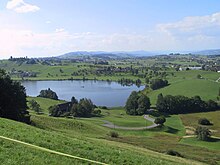Hütten, Zürich
History
Hütten is first mentioned in 1270 as ze dien Hütten.
Geography

Hütten has an area of 7.2 km (2.8 sq mi). Of this area, 52.9% is used for agricultural purposes, while 36.7% is forested. Of the rest of the land, 5.5% is settled (buildings or roads) and the remainder (4.8%) is non-productive (rivers, glaciers or mountains). In 1996 housing and buildings made up 2.8% of the total area, while transportation infrastructure made up the rest (2.8%). Of the total unproductive area, water (streams and lakes) made up 2.8% of the area. As of 2007 1.8% of the total municipal area was undergoing some type of construction.
The municipality is near the Hüttnersee, a small lake shared with Richterswil. It is a linear village (Strassendorf) made up of hamlets and farm houses along both sides of the Sihl.
Demographics
Hütten has a population (as of 31 December 2020) of 888. As of 2007, 6.5% of the population was made up of foreign nationals. As of 2008 the gender distribution of the population was 52.9% male and 47.1% female. Over the last 10 years the population has grown at a rate of 7.4%. Most of the population (as of 2000) speaks German (93.1%), with English being second most common ( 1.5%) and Albanian being third ( 1.3%).
In the 2007 election the most popular party was the SVP which received 55.7% of the vote. The next three most popular parties were the CSP (11%), the SPS (9.6%) and the CVP (7.3%).
The age distribution of the population (as of 2000) is children and teenagers (0–19 years old) make up 29.5% of the population, while adults (20–64 years old) make up 56.9% and seniors (over 64 years old) make up 13.6%. The entire Swiss population is generally well educated. In Hütten about 71% of the population (between age 25-64) have completed either non-mandatory upper secondary education or additional higher education (either university or a Fachhochschule). There are 327 households in Hütten.
Hütten has an unemployment rate of 2.11%. As of 2005, there were 93 people employed in the primary economic sector and about 35 businesses involved in this sector. 31 people are employed in the secondary sector and there are 11 businesses in this sector. 101 people are employed in the tertiary sector, with 24 businesses in this sector. As of 2007 38% of the working population were employed full-time, and 62% were employed part-time.
As of 2008 there were 359 Catholics and 413 Protestants in Hütten. In the 2000 census, religion was broken down into several smaller categories. From the census, 49.5% were some type of Protestant, with 46.2% belonging to the Swiss Reformed Church and 3.4% belonging to other Protestant churches. 36.5% of the population were Catholic. Of the rest of the population, 0% were Muslim, 2.8% belonged to another religion (not listed), 4.9% did not give a religion, and 5.9% were atheist or agnostic.
The historical population is given in the following table:
| year | population |
|---|---|
| 1850 | 718 |
| 1900 | 576 |
| 1920 | 523 |
| 1950 | 563 |
| 2000 | 860 |
Transportation
The Zimmerberg bus line (Zimmerbergbus), provided by the Sihltal Zürich Uetliberg Bahn (SZU), connects the Zimmerberg region and parts of the Sihl valley.
References
- ^ "Arealstatistik Standard - Gemeinden nach 4 Hauptbereichen". Federal Statistical Office. Retrieved 13 January 2019.
- ^ "Ständige Wohnbevölkerung nach Staatsangehörigkeitskategorie Geschlecht und Gemeinde; Provisorische Jahresergebnisse; 2018". Federal Statistical Office. 9 April 2019. Retrieved 11 April 2019.
- ^ Hütten in German, French and Italian in the online Historical Dictionary of Switzerland.
- ^ Swiss Federal Statistical Office Archived 2016-01-05 at the Wayback Machine accessed 07-Aug-2009
- ^ Statistics Zurich (in German) accessed 4 August 2009
- ^ "Ständige und nichtständige Wohnbevölkerung nach institutionellen Gliederungen, Geburtsort und Staatsangehörigkeit". bfs.admin.ch (in German). Swiss Federal Statistical Office - STAT-TAB. 31 December 2020. Retrieved 21 September 2021.
External links
- Official website (in German)
- Karl Kuprecht: Hütten in German, French and Italian in the online Historical Dictionary of Switzerland, 16 January 2008.